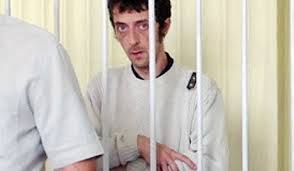Russian court illegally jails Khaiser Dzhemiliev, son of world-renowned Crimean Tatar leader

A Russian court in Krasnodar has sentenced Khaiser Dzhemiliev, son of the veteran Crimean Tatar leader and Ukrainian MP Mustafa Dzhemiliev to 5 years imprisonment. The sentence for an offence committed in Ukraine by a Ukrainian national and one on which a Ukrainian court has already passed sentence is totally illegal, and, defence lawyer Nikolai Polozov says, it will be appealed. Unfortunately, following the prosecutor’s demand for a 5.5 year sentence, it is difficult to feel any optimism about the result of such an appeal against a sentence which is also too severe.
The prosecutor’s demand and Wednesday’s sentence came a week after a jury unanimously rejected the charges of murder which Russian investigators had insisted on bringing. The jury found Khaiser Dzhemiliev guilty of manslaughter through carelessness and of illegal possession of a weapon, as had the Ukrainian court.
The jury announced its verdict on June 2. It dated Khaiser’s detention as being from the date he was arrested – May 27, 2013, meaning that he has already served two years. It also found him worthy of leniency over the charge of possessing firearms.
As reported, on April 10 this year a court in Kyiv found the 33-year old Ukrainian national guilty of manslaughter; theft of a weapon and ammunition and illegal possession of both. He was sentenced to 3 years and 8 months imprisonment, with this counted from May 27, 2013. The sentence was not appealed and has now come into force.
A Russian court on May 27 this year refused to terminate the trial despite the verdict and sentence passed by a Ukrainian court and Ukraine’s formal request for his extradition. Although Russia’s own Criminal Code makes it quite clear that a sentence passed in Ukraine is sufficient grounds for terminating proceedings on the same charges in Russia, the judge explained his refusal as being because there had been no verdict from a Russian court.
There has now been a verdict from a Russian jury and an unfairly severe and simply unlawful sentence from a Russian court.
The jury’s verdict and Ukrainian court verdict and sentence were entirely in keeping with previous rulings from Ukrainian courts from early 2014 which reinstated the original charges of manslaughter and ordered Khaiser’s release from custody. The order to release Khaiser was then reiterated by the European Court of Human Rights which on July 10, 2014 applied Rule 39, ordering that Dzhemiliev be freed. Despite the binding nature of all rulings and decisions from the Court in Strasbourg, Russia not only failed to comply, but also moved Khaiser from Simferopol in Crimea to Russia’s Krasnodar. The prosecutor rejected the charges laid back at the time of the tragic shooting in May 2013 of manslaughter through carelessness and accused Khaiser of ‘murder out of hooligan motives”’.
Mustafa Dzhemiliev has repeatedly accused the Kremlin of open blackmail by holding his son in prison and making the charges against him more serious. The aim is widely seen as being to put pressure on Mustafa Dzhemiliev to modify his unwavering opposition to Russian occupation of his homeland.
The 71-year-old former Soviet dissident spent 15 years in a Soviet labour camp, and has now, under Russian occupation, been banned from Crimea and Russia meaning that he cannot even visit his son.
In May 2013 Khaiser Dzhemiliev shot and killed Fevzi Edemov who was working as a guard to the family. All the evidence pointed to manslaughter, yet Russia claimed ‘murder out of hooligan motives’





